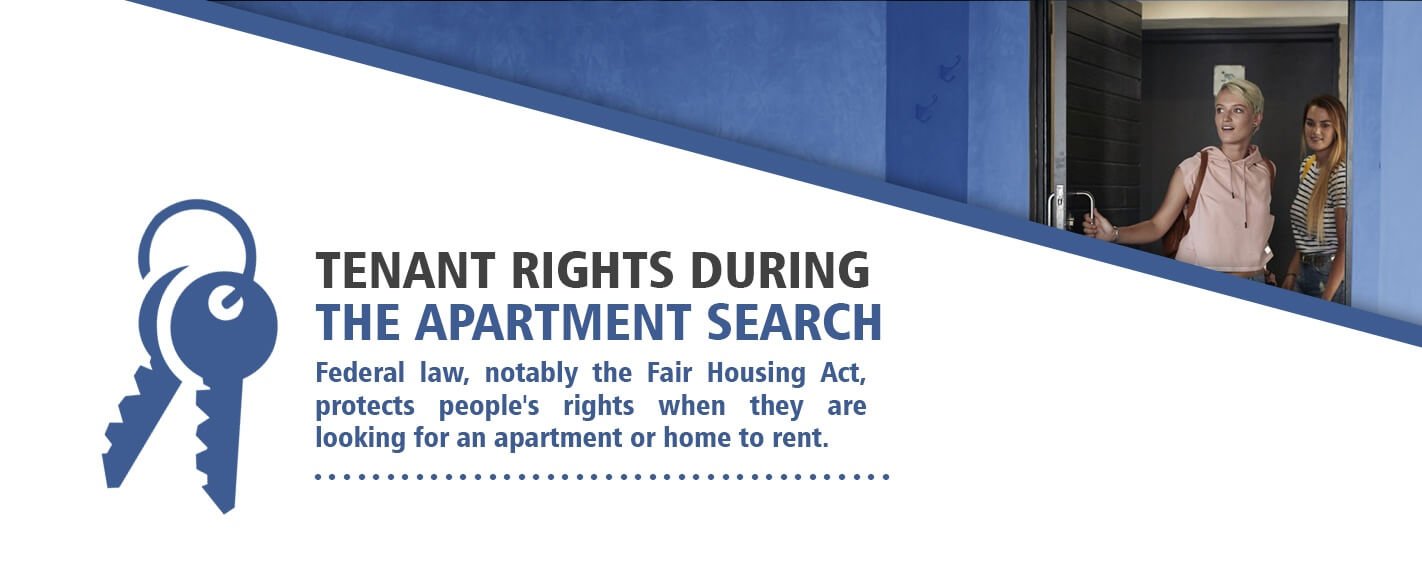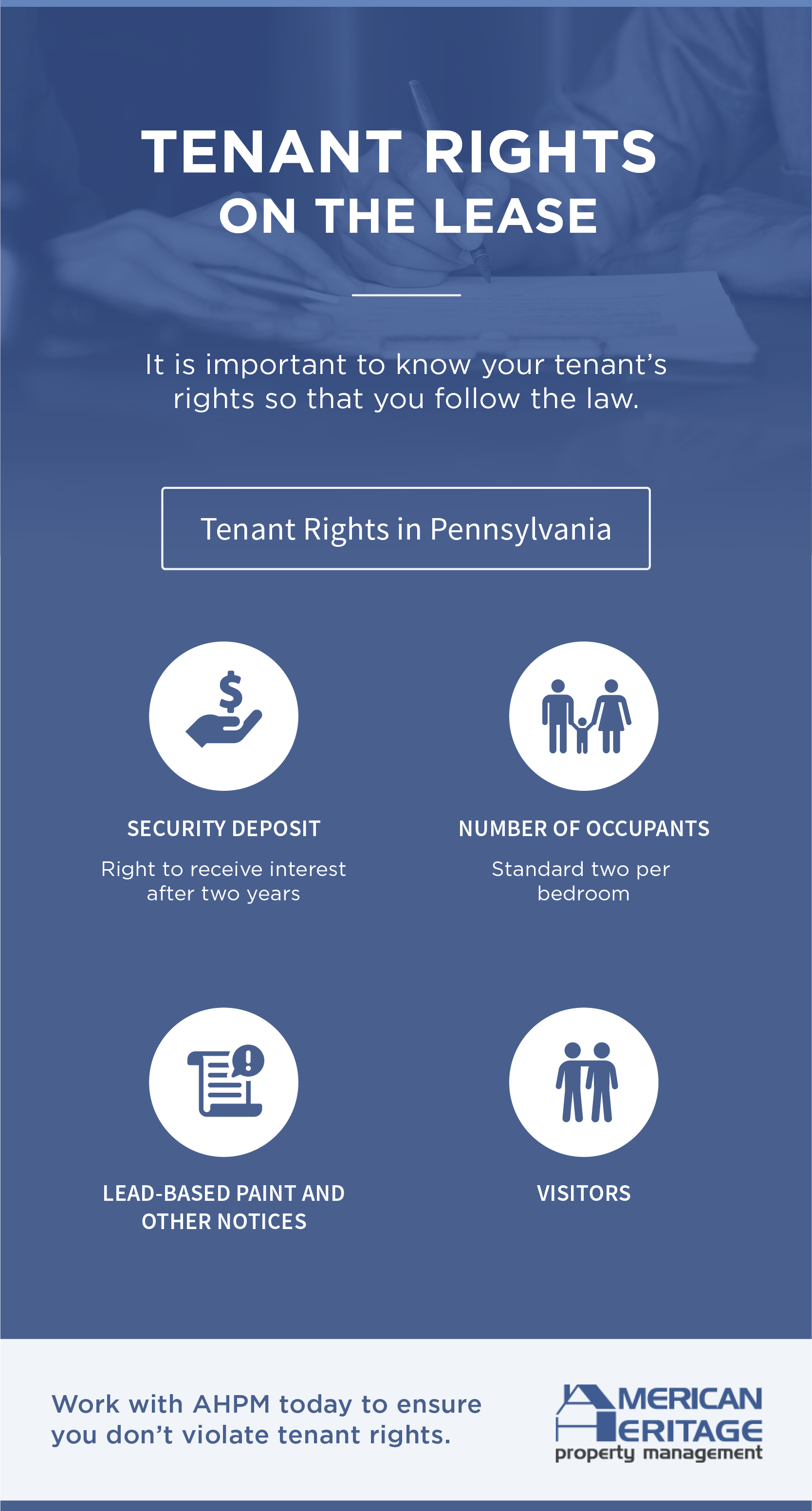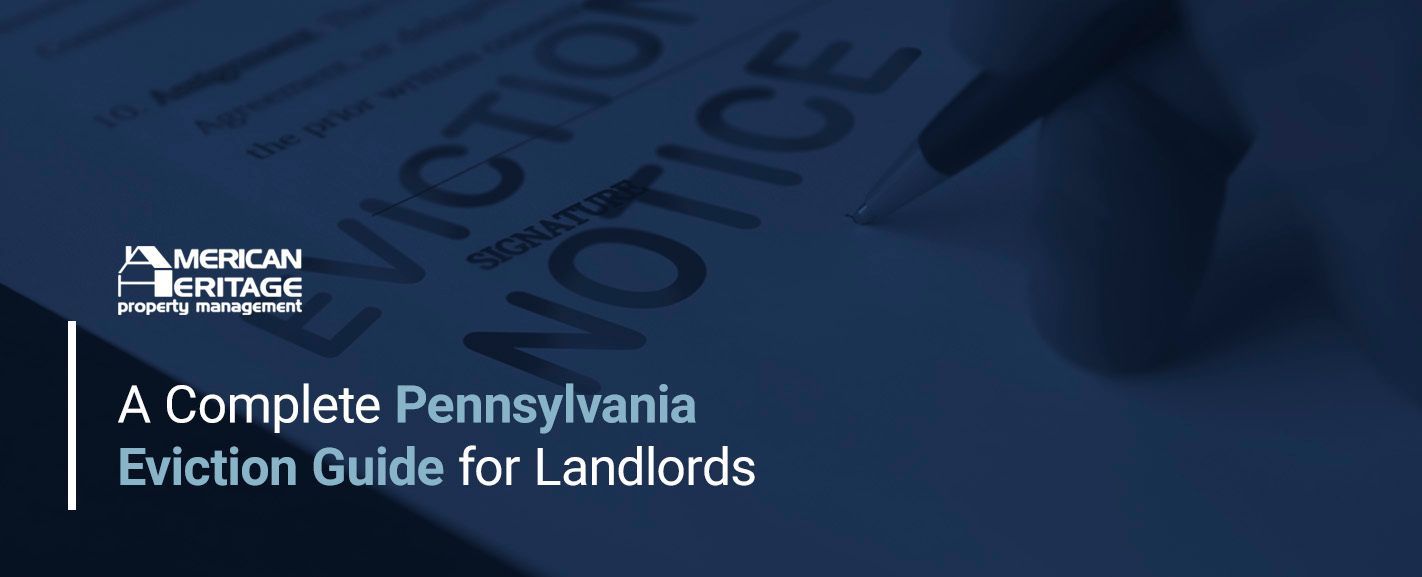13 Tenant Rights All Pennsylvania Landlords Must Know
Owning and renting out properties is a two-way street — landlords and tenants have rights and responsibilities. The landlord-tenant relationship can be smooth when everyone is on the same page about what they can legally do. Although your legal rights as a landlord may be your concern, it’s also essential to be aware of the renter rights of your tenants.
Seasoned landlords and aspiring property managers can ensure they're well-informed and prepared with a guide on how to become a landlord in PA.
What Are Tenant Rights in Pennsylvania?
Tenants have renter rights in PA that grant a habitable living environment, fair treatment and a clear understanding of lease terms. Renters are entitled to privacy, with landlords required to provide notice before entry, except in emergencies. Awareness of these rights is your first step toward a secure and comfortable rental experience.
There are two categories of renter rights — federal rights and state rights. If you own and lease property in Central Pennsylvania, you’ll want to have a grasp of tenant rights under the Pennsylvania Landlord and Tenant Act.
Here is a rundown of some of the key rights for renters — from searching for a home and signing the lease to moving in and living in the property.
- Tenant Rights During the Apartment Search
- Tenant Rights on the Lease
- Tenant Rights After They Have Moved Into a Property
- Tenant Rights if There is Something Wrong
- Tenant Rights at the End of the Lease
Tenant Rights During the Apartment Search
Federal law, notably the Fair Housing Act, protects people’s rights when they are looking for an apartment or home to rent. The Fair Housing Act protects prospective tenants across the U.S. against housing discrimination and ensures equal access to housing. Additionally, the Pennsylvania Human Relations Act provides even broader protections at the state level, adding ancestry and the use of a guide or support animal as protected categories.
1. Equal Housing Rights
Landlords must uphold equitable inclusion and consideration of everyone in several categories under both federal and state law. These protected categories include:
- Color
- Disability
- Familial status
- National origin
- Religion
- Race
- Sex
Although federal law protecting housing rights has been around since the late 1960s, more action is necessary. In recent years, we’ve seen a growing awareness and proactive approach towards fair housing practices. This positive change is evident in the increasing commitment to housing equality, particularly concerning disability, race and family status.
For landlords keen on upholding fair living conditions, partnering with a property management company for tenant selection is beneficial. That collaboration helps ensure compliance with PA rental laws and fosters a more inclusive and welcoming community for potential tenants.
2. Marketing and Advertising Rights
When a landlord markets or advertises an apartment or other property for rent, they need to be sure that the marketing upholds the Fair Housing Act or equally considers all tenants. In their property marketing, a landlord should focus on the amenities and features that make their properties attractive for prospective tenants. That approach adheres to the law and invites families of various backgrounds to find their next home in a welcoming community. By emphasizing these practical and inclusive aspects, you can show your commitment to serving diverse housing needs.
3. Rights Regarding the Credit and Consumer Check
It’s fairly common for landlords to run a credit check on a potential tenant. While having a history of good credit can't ensure that a tenant will pay their rent on time, it does suggest that a tenant has a history of doing so.
Under the Fair Credit Reporting Act, landlords need to follow a few rules and guidelines to make sure that they respect a tenant’s rights. First, a landlord can only get a credit or consumer report on a current or potential tenant if they have that person’s permission.
Once you’ve reviewed a tenant’s credit or consumer report, you can decide what to do next. Remember to uphold fairness and respect in tenant dealings. It’s important to consider that the law views any significant deviation from offering a lease as an “adverse” action. Adverse actions after reviewing a report include:
- Requiring a co-signer
- Turning down the application
- Increasing the rent
- Increasing the security deposit
You must let the tenant know if you choose to do any of those things. Tenants have the right to see their reports and dispute any information on their reports.
Tenant Rights on the Lease
Tenants’ rights influence the lease terms and how much you can collect from the tenant upfront. Here are a few tenant rights that relate to the lease.
4. The Security Deposit
As a landlord in Pennsylvania, you can collect up to two months’ rent as a security deposit during the first year a tenant lives in a property. If a tenant lives in your property for two years or longer, you can only hold up to one month’s rent as a deposit. After two years, the tenant has the right to receive interest on the security deposit.
5. Lead-Based Paint and Other Notices
If the apartment or house you are renting dates from before 1978, you need to provide tenants with a notice about lead-based paint, including an EPA-approved pamphlet on the subject. If you know for a fact that the paint used on the interior or exterior of the property contains lead, you need to state that in the lease.
6. How Many People Can Live in the Property
Who can live in the rental property and who can visit it? Pennsylvania landlord-tenant law allows tenants the right to have visitors as long as they continue to observe their other obligations as a tenant. A landlord can't forbid overnight guests or put a limit on how many visitors a renter has during a week or the month.
When it comes to how many people can live in an apartment or other rental property, the standard is two people per bedroom. So, a two-bedroom house could accommodate up to four people. The recommendation is flexible, though— a landlord might have acceptable reasons for allowing fewer occupants. For example, if each bedroom was tiny, a court might allow a landlord to determine the number of occupants to one per bedroom.
On the other hand, there are also cases where the two people per bedroom standard can't apply if more people are living in a property. For example, if a couple living in a one-bedroom apartment has a baby, a landlord will have a difficult time evicting the couple for occupancy reasons.
7. Rights If the Lease Terms Violate the Law
Although a lease is a legal agreement between a landlord and a tenant, putting a clause into a lease that defies the law makes the clause illegitimate. In lease agreements, landlords can detail a “pet-friendly environment” while accommodating service animals, as the Fair Housing Act requires. Landlords can establish positive guidelines for guest visits and family-friendly living, aligning with legal standards and tenant rights. These proactive measures ensure compliance with fair housing regulations and create a welcoming, inclusive environment for all tenants.
8. Rights for “No-Lease” Agreements
In informal lease agreements, such as oral month-to-month tenancies, landlords and tenants still have clear rights and responsibilities. These arrangements provide flexibility while still ensuring stability and mutual respect.
Landlords have the opportunity to maintain open communication and transparency, ensuring rent adjustments and property decisions are made fairly. On their part, tenants can enjoy the flexibility of these arrangements with the assurance that the landlord values their rights.
Documenting all agreements and communications is a best practice in these scenarios.
Tenant Rights After They Have Moved Into a Property
Tenants’ rights continue even after they move into an apartment. Pennsylvania rental property laws extend to a tenant’s use and enjoyment of a home after they’ve signed the lease, received the keys and moved in their belongings.
9. Right to Quiet Enjoyment
Once they’ve signed the lease and paid their rent, tenants have the right to enjoy their homes peacefully. The right to quiet enjoyment of a property for a tenant means that a landlord can only enter a property when the tenant permits. If a landlord needs to enter the property to make repairs or for another legitimate reason, they must provide the tenant with reasonable notice.
Landlords in PA have the right to enter your property for specific reasons like maintenance, inspections or showing the property to potential renters or buyers. However, that comes with the caveat of providing reasonable notice, typically 24 hours, ensuring your privacy and convenience receive due respect.
10. Right to a Safe and Habitable Home
Tenants have a right to occupy and live in a safe and habitable home. In 1979, the Pennsylvania Supreme Court decided that it is the responsibility of the landlord to ensure that a property is safe and sanitary. Several factors can influence a home's safety and capacity for human habitation. Generally speaking, a property needs the following to be safe and sanitary:
- Working smoke alarms
- Working hot water
- Drinking water
- Heat
- Adequate waste disposal and sewage
- Functioning/locking windows and doors
- Functioning bathroom(s)
Although tenants have the right to a safe home, they also have some responsibilities. For example, if the heater breaks or there is an issue with the water lines or sewer, they must notify the landlord. One of the key landlord responsibilities is promptly providing repairs or correcting the problem. The timeframe for correcting the issue depends in large part on the problem and the season. If the furnace breaks in the middle of January, then it needs to be fixed right away. But if it breaks in August, a landlord can put off repairs until they are necessary.
Tenant Rights If There Is Something Wrong
In Pennsylvania, tenants are well-supported when it comes to addressing property issues.
11. Right to Withhold Rent
Under the law, tenants must maintain continuous and successful rent payments. There is a process and procedure if they remain on the property without paying rent due to maintenance or repair issues. If the tenant notifies the landlord of the problem and the landlord delays repairing it, the tenant has the right to have the city or municipality’s housing inspector come out to investigate.
What happens next depends on the inspector’s decision. If the inspector declares the home to be uninhabitable, the tenant does not need to keep paying rent on the property. Should the tenant decide to remain in the property, they will pay rent, but not to the landlord. Instead, their monthly rental payments will go into an escrow account. If the landlord makes the needed repairs within six months, they will get the money in the escrow account.
12. Right to “Repair and Deduct”
Another right tenants have in Pennsylvania is to make necessary repairs themselves and then claim the cost of their repairs from their rent. To qualify for this provision, repairs need to meet certain conditions. First, the tenant needs to have told the landlord about the problem.
Second, the repairs need to have been necessary to make the property habitable — a tenant can't upgrade appliances when theirs were already working and give the landlord the bill. The repairs also need to cost less than the total amount of rent remaining on the lease.
Tenant Rights at the End of the Lease
As the end of the lease gets nearer or right after a tenant moves out, they still have a few legal rights landlords need to know about.
13. Giving the Tenant Notice
If you would like to change the rental status of a particular tenant after their lease is up, you need to provide them with ample notice. How much notice depends on the length of the lease. For leases under one year or for month-to-month leases, Pennsylvania landlord laws require that you give tenants at least 15 days' notice. In the case of leases that are for a year or longer, you’re required to give at least 30 days' notice.
You also need to give tenants notice as part of the eviction process if you
plan on evicting them. How much notice is required depends on the reason for the eviction. In Pennsylvania, it’s usually anywhere from 10 to 30 days.
14. Giving the Security Deposit Back to Tenants
Tenants have the right to get their security deposit back when they move out. They need to receive the deposit back within 30 days of leaving the property. If you deducted anything from the deposit, you also need to provide an itemized list of any damages and the amount of the charges for those damages. If you withhold the full amount of the security deposit from the tenant, they have the right to sue for double the amount of the deposit.
Let AHPM Help You Manage Your Property
Remembering all of Pennsylvania’s landlord and tenant laws might seem like a lot of work. Working with an experienced property management company is one way to make sure that you uphold the law and respect tenants' legal rights when leasing apartments.
American Heritage Property Management has been helping landlords with rental assistance in Central Pennsylvania and the Baltimore area for more than 40 years. We handle everything from tenant screening and lease preparation to property maintenance and tenant transitions.
Contact us today to learn how we can help you achieve peace of mind and concerns of being a landlord and
managing properties.










